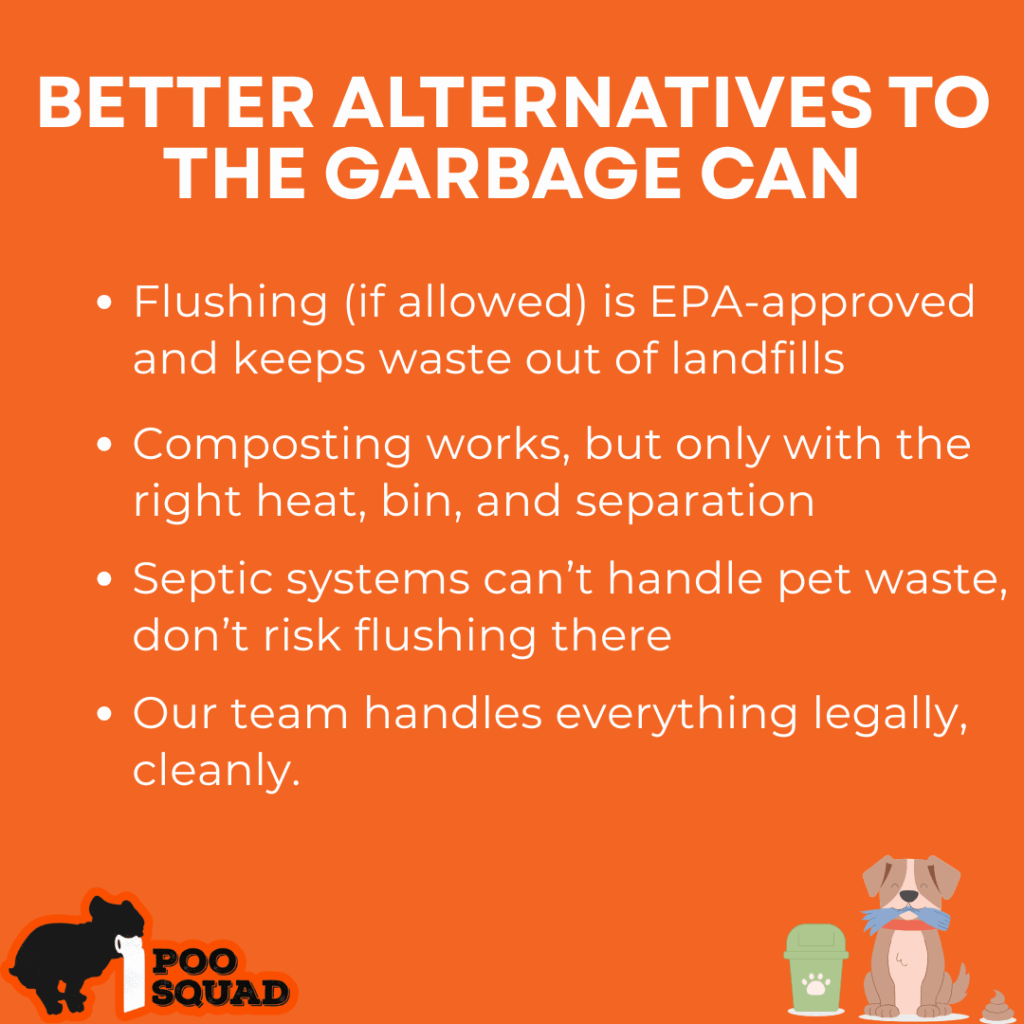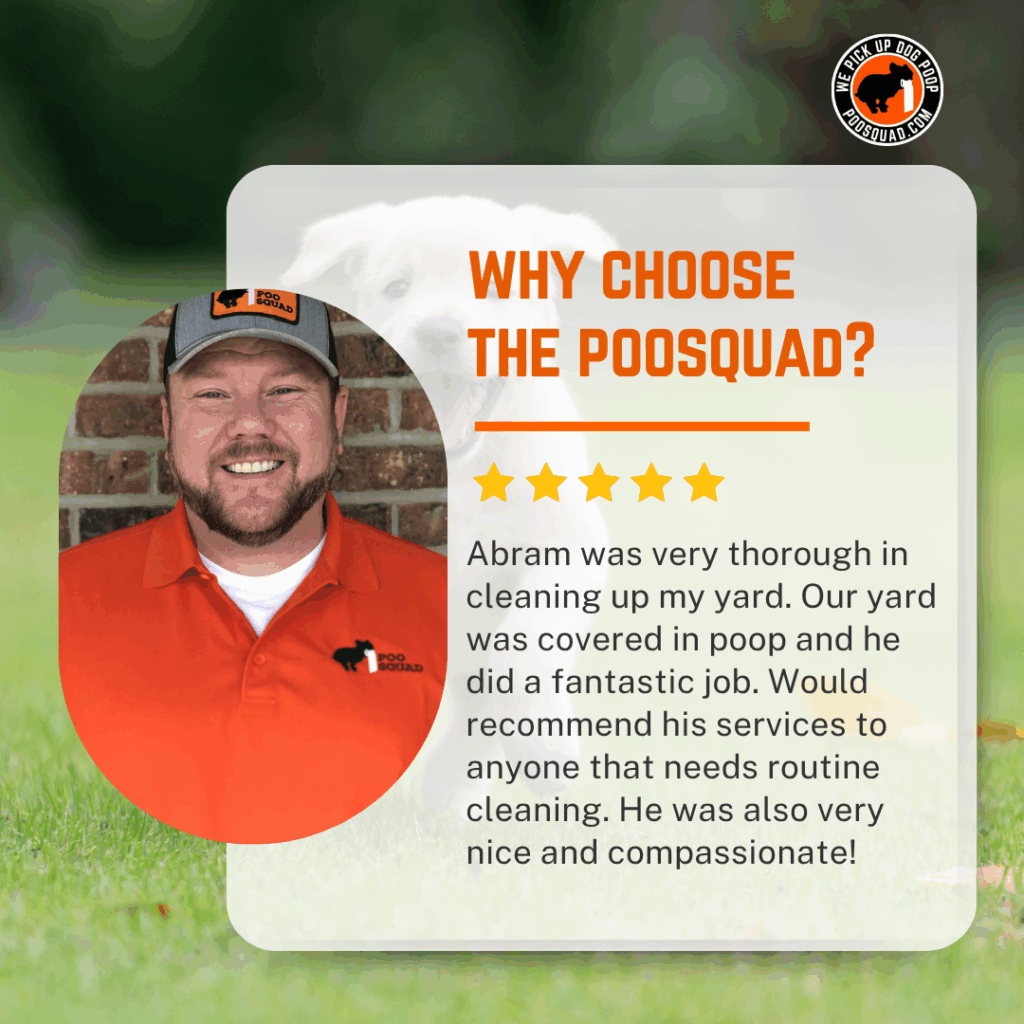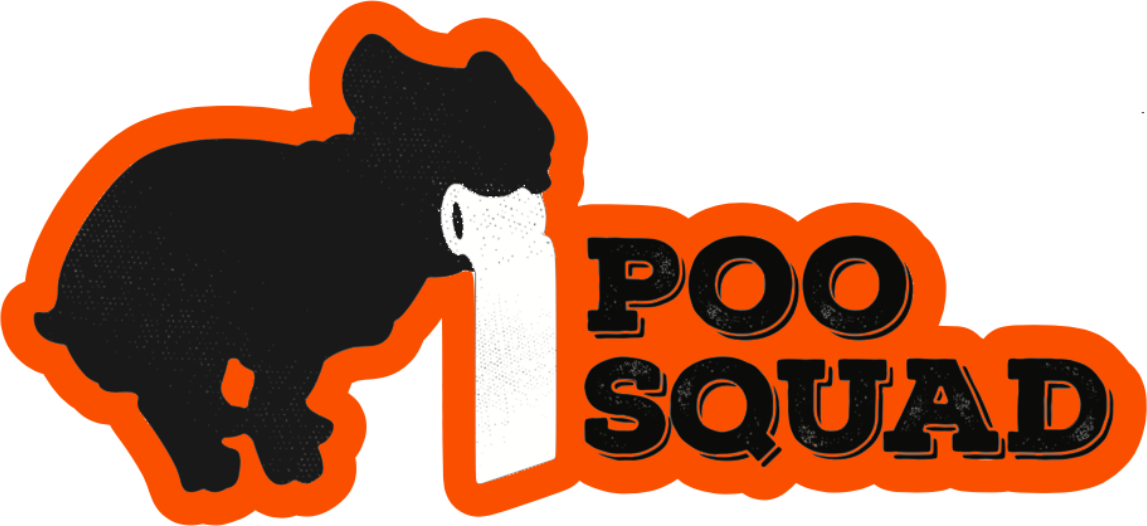Throwing dog poop in your garbage is usually legal if it’s sealed in a bag and placed in the correct bin. However, some cities restrict it, especially in shared dumpsters or public trash cans. Always check local rules to avoid fines and sanitation issues.
Throwing dog poop in the trash seems like common sense, but depending on where you live, it can get you fined. In most areas, it’s legal if the waste is securely bagged and placed in your bin. However, HOAs, apartment rules, and city sanitation laws often create gray areas that can confuse even the most responsible pet owners.
Some cities, such as San Francisco, ban pet waste in general trash altogether. Others require double-bagging, specific disposal bins, or forbid tossing poop in public or shared cans. Even when legal, poor disposal habits can trigger complaints, pest problems, and even health risks around your home.
If you’re unsure what’s legal or tired of dealing with it, this guide walks you through what rules apply, how to avoid legal trouble and smarter alternatives that keep your property clean and complaint-free.
When Tossing Poop Becomes a Legal Problem
Not all trash cans are created equal when it comes to dog poop. While many municipalities allow you to throw it away with your regular household garbage, local laws, HOA policies, and sanitation codes can complicate things fast. A simple mistake, like using the wrong bin or skipping a bag, can turn into a fine or a furious neighbor.
Local Rules That Can Get You Fined
If you live in a city like San Francisco, dog waste can’t legally go in regular garbage bins. Other areas may allow it, but only if it’s double-bagged and properly sealed. And in certain counties, tossing it into someone else’s bin during a walk (even if it seems like a victimless act) is considered illegal dumping. Some towns even have rules about how long pet waste can sit curbside before trash day.
That’s why we’ve trained every commercial dog poop pickup team to understand regional regulations before they ever step foot on your property. Whether we’re servicing an HOA or a dog park, legal compliance and community trust come first.
What About Apartments, HOAs, and Shared Dumpsters?
Living in a complex? You’re probably under more scrutiny than you realize. HOAs often require poop to be bagged a specific way, or prohibit it from going into shared dumpsters entirely. The same goes for apartment buildings with tight sanitation policies or limited pickup days. Dumping without checking can mean rule violations, extra fees, or even warnings from property management.
We’ve seen customers switch to us after getting slapped with fines for something they didn’t even realize was “wrong.” Sometimes the issue wasn’t the poop, it was where and when it was trashed.
Safe and Sanitary Ways to Toss It (If It’s Legal)
Even if your city or county gives you the green light to trash dog poop, that doesn’t mean you should drop it in the bin and walk away. Dog waste is a biohazard, not a banana peel. It carries bacteria that can damage lawns, contaminate water, and create health risks that most people underestimate, even the idea that dog poop could be good for your grass is a myth. Tossing it wrong is not only gross, it’s dangerous, unsanitary, and could turn your garbage can into a stink bomb no one wants near the house.

Bag It Tight, Double If You’re Smart
Single-bagging might feel like enough, but it often is not. Most local regulations (and sanitation workers) strongly prefer dog poop to be double-bagged, sealed in two separate layers to contain bacteria, odor, and potential leaks.
It’s not about being fancy; it’s about preventing maggots, flies, and raccoons from treating your trash bin like an open buffet.
And no, those trendy biodegradable bags aren’t the magic answer. Most of them still take decades to break down in landfills, especially once they’re sealed in an oxygen-starved environment. That’s why we don’t rely on gimmicky “green” bags. We rely on clean protocols and safe disposal.
Don’t Use Someone Else’s Trash Can
It might seem harmless to drop a poop bag into a neighbor’s bin while you’re out walking your dog, but in many cities, that’s considered illegal dumping. Even where it’s not illegal, it’s bad form. No one wants to open their bin and get hit with a hot wave of someone else’s dog mess.
If you’re on the move and don’t want to carry poop until you’re home, it might be time to think about a pickup service. Our yard sanitation and deodorizing service even keeps outdoor areas fresh between scoops, so there’s zero temptation to cut corners.
Skip the Trash Altogether When It’s Hot
During the summer months, even bagged waste can cook inside a trash bin.
That smell?
It doesn’t stay in the can. It seeps into garages, driveways, and outdoor entryways. We’ve talked to customers who tried every trick, freezing the poop, sealing it in coffee cans, spraying it with bleach, only to find themselves Googling “how to keep dog poop from smelling in the garbage.”
Here’s a better solution: don’t deal with it at all. Our service never uses your bins. We scoop, sanitize, and haul away what we legally can, or dispose of it on-site according to your local rules. That means no stink, no pests, and no surprise infestations.
Better Alternatives to the Garbage Can
Not every poop needs to end up in your trash. If you’re dealing with multiple dogs, shared living spaces, or sensitive neighbors, it might be time to look beyond the bin.
The good news?
There are smarter, cleaner, and more environmentally responsible ways to get the job done, without stinking up your curb or crossing any legal lines.

Flush It (Seriously)
Flushing dog waste down the toilet might sound strange, but it’s one of the most eco-friendly disposal methods, especially when you compare it to letting dog poop sit in your yard, where it can kill grass and harbor disease. Your plumbing is designed to handle human waste, and dog poop is not all that different. This method keeps it out of landfills, reduces methane emissions, and minimizes the use of plastic bags.
But, and it’s a big but, do not flush if you’re on a septic system. It can throw off the bacterial balance in your tank and lead to serious plumbing issues. If you’re unsure whether flushing is an option, check with your local utility provider before you start sacrificing poop bags to the porcelain gods.
Compost It (With the Right Setup)
Yes, dog poop can be composted, but not with your vegetable scraps. Traditional backyard compost bins aren’t hot enough to kill off harmful pathogens. To do this safely, you’ll need a pet-specific composter and a separate area away from food gardens. And don’t expect quick results. Even in the right conditions, it takes months to break down safely.
Composting might work for a backyard hobbyist with one dog, but if you’ve got a couple of pups and limited time, a safer option might be hiring professionals who already know what works.
We tailor our pickups and sanitation services to your region’s capabilities, whether that’s compost, landfill-safe disposal, or something in between.
Let Us Handle It
You wouldn’t guess how many clients come to us after trying every home remedy and DIY fix they could find online. They’ve frozen poop, built compost bins, and even installed “poop-only” mini trash cans. And then they realize, this whole thing doesn’t have to be their problem.
With our residential pooper scooper service, you don’t have to think about bags, bins, compost, or legal risk. We show up on schedule, clean every square foot of your yard, and follow your local disposal laws to the letter. We don’t cut corners, and we don’t leave any behind either.
What’s the Real Risk If I Do It Wrong?
Improper dog poop disposal is not only a matter of neighborhood etiquette; it can lead to legal trouble, environmental damage, and serious health risks. That one bag you toss in the wrong place can cause more problems than you’d think, especially when multiplied by every other dog owner doing the same thing.
Environmental Fallout Adds Up Fast
Dog poop is not fertilizer. It’s loaded with pathogens like coliform bacteria, roundworms, and even E. coli, posing real health risks to both humans and pets. coli that can contaminate water supplies and destroy plant life. Left to rot in the wrong place, or worse, tossed in a landfill wrapped in plastic, it can contribute to stormwater pollution, ammonia leaching, and methane gas buildup.
Even the “green” bags claiming to be compostable won’t decompose properly in oxygen-starved landfills. In many cases, they break down into microplastics that end up in our soil and waterways. That’s why we focus on safe collection, not misleading labels or shortcuts.
Health Hazards for Pets and People
Leaving waste in bins, especially unsealed or in hot climates, can attract flies, maggots, raccoons, and other pests. These aren’t only unpleasant visitors; they carry disease. If you’ve got young kids or curious pets, a trash can turned biohazard is not only gross, it’s a real risk.
That’s why our team never cuts corners when it comes to sanitization. We clean every tool and even our shoes between yards. It might sound over the top, but if your dog’s been sick or a neighbor’s pet had parvo, that one step could prevent an outbreak.
Small Mistakes Can Cost You Big
We’ve seen customers get cited for tossing poop in park bins, fined by HOAs for using the wrong dumpsters, or end up in arguments with neighbors over mystery waste in shared cans. It’s usually not done maliciously, only misunderstood. But when local policies are enforced, ignorance doesn’t help your case.
With our commercial scooping plans, we’ve helped property managers, HOAs, and even cities avoid these problems entirely by taking disposal off their hands, and doing it by the book.
Responsible Disposal Builds Community Trust
Dog poop might seem like a personal problem, but how you handle it says a lot about how you treat your neighbors, your city, and even your dog. We’ve worked with communities that have cracked down on dog waste simply because a few people kept leaving bags in the wrong places. You might not get caught, but someone’s always watching (or smelling).
Legal is not Always Respectful
Because your city allows dog poop in the garbage doesn’t mean your HOA, property manager, or next-door neighbor is on board. Trash bins aren’t all created equal, and tossing poop into the wrong one can easily trigger complaints or even fines. We’ve heard from clients who got written up by management companies for dumping in the community dumpster, even when it was “legal.”
Our teams work directly with local policies so that everything we do is not only legal, it’s welcomed.
When the Trash is not an Option, We Are

If the rules in your area are confusing, strict, or changing often, there’s an easier solution than memorizing sanitation codes: don’t deal with it. With our residential poop pickup service, you don’t have to second-guess a thing. No bins. No bags. No gray areas.
It’s not only about convenience, it’s about setting a higher standard for pet ownership. That’s what builds community trust and keeps neighborhoods clean, calm, and conflict-free.
Key Takeaways
Dog poop belongs somewhere, but not anywhere. While many areas allow trash disposal with the right precautions, others place strict limits on how, where, and even when you can toss it. That makes understanding your local rules essential, and skipping the guesswork even smarter.
- Yes, it’s usually legal to throw dog poop in your garbage if it’s sealed and bagged properly.
- No, it’s not okay to dump it in someone else’s trash can, especially in public areas or shared housing.
- Double-bagging helps contain bacteria, odor, and pest issues.
- Flushing and composting are alternatives, but only if you’ve got the right plumbing or setup.
- If you’re tired of handling it yourself, we can take it from here, with legal, hygienic, and zero-contact service options tailored to your area.
Tired of second-guessing? With our poop scooping and yard sanitation services, there’s no more worrying about rules, rot, or responsibility. You enjoy your yard, we’ll handle the crap.
Questions Pet Owners Are Asking (Answered)
Can I Freeze the Poop Before Trashing It?
Yes, people ask this, and some even do it. In theory, freezing poop before trash day can reduce odor, but it’s messy, awkward, and wildly unnecessary when better systems exist. A sealed outdoor bin with odor-blocking liners and weekly pickups is a cleaner, more sustainable solution. Or better yet, skip the trash entirely and let us handle it.
How Do I Store Poop Without Making My Whole Garage Smell?
We’ve seen folks try everything from double-bagged poop pails to dumping baking soda into every bag. The truth? If you’re storing dog waste in your garage for any length of time, it’s going to smell eventually. Using bins with gasket-sealed lids helps, but what solves the problem is keeping the waste out of your home environment altogether, which is why our service never touches your trash cans.
Can I Use City Compost Bins?
In almost every city, no. Municipal composting systems do not accept pet waste due to the risk of parasites and bacteria contaminating the compost. Even if your city offers compost pickup, the green bin is for food scraps and yard trimmings, not poop.
Is It Illegal to Toss It in Someone Else’s Trash Can on a Walk?
In many places, yes. Even where it’s not explicitly outlawed, it’s often categorized as illegal dumping or a sanitation code violation. And even if you avoid a fine, you might spark a neighborhood feud. A little bag can create big problems when it’s not your bin.
Do I Need a Special Kind of Bag?
Technically, no. Most municipalities don’t require a specific brand, but they do require that the waste be securely sealed and leak-proof. We’ve found that two standard grocery bags (layered) do the job better than most “eco” alternatives.
